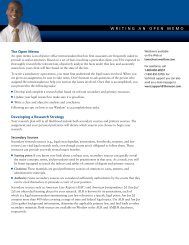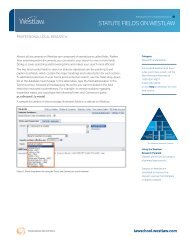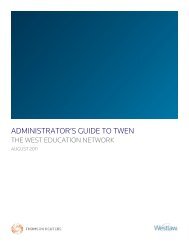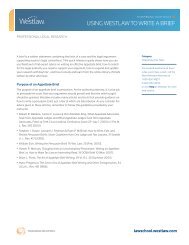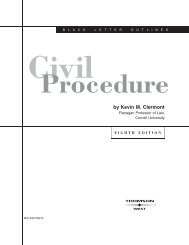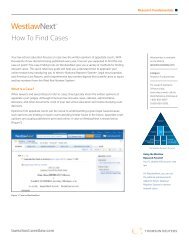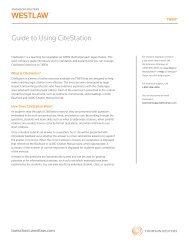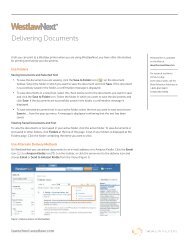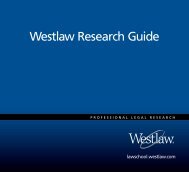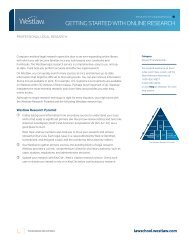Winning Research Skills - Westlaw
Winning Research Skills - Westlaw
Winning Research Skills - Westlaw
Create successful ePaper yourself
Turn your PDF publications into a flip-book with our unique Google optimized e-Paper software.
Chapter 3<br />
each annotation. (The USCA database on <strong>Westlaw</strong> includes hypertext links to many annotated<br />
references.)<br />
You will occasionally see an annotation to an attorney general opinion. Although these opinions<br />
are only persuasive, they can be useful. Some statutes have been interpreted by the courts so<br />
many times that West provides an index to the annotations. Some statutes may not have been<br />
the subject of litigation and, therefore, will not have any annotations.<br />
Finding a Statute in the USCA<br />
Here are some tips that will help you use the USCA in print:<br />
■ When you need a specific statute but know only the subject of the law, you will need to use the<br />
multivolume General Index. It is important to consider alternative terms when using the index.<br />
The index includes many cross-references that can lead you to the correct section.<br />
■ If you know the popular name of an act or its acronym, such as the Freedom of Information<br />
Act (FOIA), you can check the Popular Name Table located at the end of the General Index.<br />
The popular name of an act is the name by which it is commonly known. Sometimes, an act is<br />
commonly known by the name of its author. For example, the Sarbanes-Oxley Act of 2002 is<br />
named after its authors in the Congress.<br />
■ If you approach the USCA with either the public law number or the Statutes at Large citation,<br />
you can check the volume labeled Tables at the end of the set. These tables translate the public<br />
law number and the Statutes at Large citation (broken down into the law’s component section<br />
numbers) into the corresponding USCA citation.<br />
Updating the USCA<br />
The constant possibility of change in legislation means that you must always check a law for<br />
recent changes. Look at the publication date (copyright date on the back of the title page) of the<br />
hardbound volume of the USCA to determine whether a law needs updating.<br />
These publications can help you check for changes in legislation:<br />
■ Pocket Parts<br />
To check for amendments, deletions, and new annotations that have appeared since the bound<br />
volume was published, refer to the supplementary pamphlets inserted in the back of each<br />
volume; these are called pocket parts because they fit into pockets in the cover of each volume.<br />
The pocket parts are arranged by the same section numbers as the bound volume. Always<br />
check the pocket part!<br />
■ USCA Statutory Supplements<br />
Because pocket parts to the USCA appear only once a year, there are times when a new law or<br />
amendment is not yet included. To fill this gap, the USCA issues bimonthly noncumulative<br />
pamphlets that contain the newest laws and amendments arranged in USCA classification<br />
form. All the new annotations also appear in these pamphlets. Usually, two additional<br />
pamphlets will be issued as needed. These are the USCA statutory supplements containing all<br />
amendments to the code through the last law of the session signed by the president. These two<br />
pamphlets are not arranged in USCA classification form, but are in public law form. Late in<br />
any given year, you will have to check the main USCA volume, the pocket part, and each of<br />
the year’s pamphlets. Many people forget to check the pamphlets. Don’t be one of them!<br />
38 <strong>Winning</strong> <strong>Research</strong> <strong>Skills</strong>



